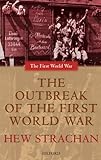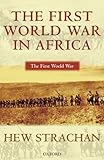
Hew Strachan. The Outbreak of the First World War. Oxford: Oxford University Press, 2004. x + 299 pp. $19.95 (paper), ISBN 978-0-19-925726-3.

Hew Strachan. The First World War in Africa. Oxford: Oxford University Press, 2004. x + 224 pp. $19.95 (paper), ISBN 978-0-19-925728-7.
Reviewed by Bryan Ganaway (Department of History, Presbyterian College)
Published on H-German (June, 2006)
The volumes under review are reprints taken from parts of the first volume of Hew Strachan's monumental history of World War I, To Arms (2001). Although they contain almost no new material, they are compact, well-written books that present aspects of the author's thought in digestible fashion to academics looking to revise their World War I lectures or students searching for an overview of diplomatic, strategic and tactical issues. Strachan has spent an academic lifetime reading about the Great War and it shows in the global reach of his knowledge. I find it hard to believe that anyone could ever write a more detailed tactical account of the colonial wars in Africa from 1914-1918. Nonetheless, this impressive erudition produced a strikingly traditional interpretation of the conflict.
In The Outbreak of the First World War Strachan argues that the Austro-Hungarians were largely responsible for the war; that public opinion was important in sustaining the conflict but that political elites began it; and that intellectual responses to this cataclysm should not be confused with popular reactions. He begins by returning to Fritz Fischer's 45-year-old contention from Germany's Aims in the Great War (1961) that the Kaiser and his generals wanted a conflict that would ensure military domination of the continent. He critiques this argument by suggesting that the Austro-Hungarians bear greater blame because they were the only ones who could have taken a moderate approach to Serbia and prevented a general conflagration. The early chapters contain detailed accounts of Agadir and the Second Moroccan Crisis to show that only a diplomatic account can really make sense of how the war began. I tried to keep careful count; according to Strachan fifty-six men are primarily responsible for the beginning of World War I. These include traditional villains such as William II, but also more obscure characters such as Rade Popovic, Moritz von Lyncker, I. K. Grigorovich and Eyre Crowe. Strachan suggests the leaders of 1914 were not of the same caliber as their predecessors in the nineteenth century. He derides Chancellor Bethmann-Hollweg as no champion of the art of Realpolitik in the mold of Otto von Bismarck. He maintains that Franz Conrad von Hötzendorff, the Austrian Commander-in-Chief, was ineffective in the July Crisis because he was in love with the wife of an industrialist. I am not certain that either of these contentions is provable or relevant. I think Strachan would have been better served by inscribing this argument within a broader discussion of nationalism, imperialism, competition and Social Darwinism. I am simply not convinced that if Bismarck had still been around, World War I would not have happened.
The second half of the book is more interesting. Strachan acknowledges that initially, enthusiasm for the war was widespread, but suggests that our common understanding of this phenomenon requires revision. First of all, he argues that public opinion was not a factor that caused the war because the mandarins running Europe made their decisions independently of popular feelings. Just about everyone else followed along. Second, Strachan usefully reminds us that the way socialist or nationalist intellectuals reacted to the war should not be confused with the way average citizens understood armed conflict. Many thinkers had read some version of Nietzsche and Spencer and no doubt sincerely believed war could be cathartic. Many of them initially supported it, including people, like Max Weber, who knew better.
Strachan contrasts this attitude with more plebeian responses by pointing out that the conflict was more popular in the cities than the countryside. Most European men from rural or working-class backgrounds served as conscripts, so for them, the beginning of the war simply meant doing one's duty. Some may have read exemplars of the preposterous next-war fiction, which portrayed combat as glorious, but recent scholarship has shown that for many young males from working backgrounds, the conflict was accompanied by religious resignation or by fears of unemployment and starving families. Strachan believes this information shows us that popular enthusiasm played no part in beginning the war, although governments successfully cultivated nationalist enthusiasm to keep soldiers and civilians in the fight for the next 52 months. In this model, the elite leads and the larger population can only follow or resist; they do not exert true agency.
The First World War in Africa is a re-branded version of Strachan's long chapter on Africa in To Arms.[1] It is an incredibly detailed tactical account of the conflict that focuses on the leading European and white African personalities who fought in this continent during World War I. It is so detailed, in fact, that even the copious maps provided by Oxford University Press do not contain all of the small villages and rivers that witnessed platoon-sized and company-sized battles in his account. I was forced to beat a hasty retreat to the venerable Britannica Atlas. It will surely stand as a definitive account of combat in Africa for decades. On the other hand, I am not certain how relevant it is for most scholars to know that the radio station at Kamina in Togoland fell after the British forced the River Chra against very little opposition and captured "three machine-guns, 1,000 rifles, and 320,000 rounds, enough for several days' continued resistance" (p. 17). The best parts of the book are the two long chapters on German East Africa dealing with the guerilla war waged by Paul Lettow-Vorbeck for over four years; here the author talks about how Europeans and Africans interacted. Strachan masterfully demonstrates how German military leaders attempted to coordinate defense with colonial officials along rail lines using Askari tribesmen as their prime fighting force. The local government raised troops, manufactured munitions and harvested crops more or less successfully, and tied down a disproportionate number of Allied troops (also mostly Africans).
For those academics and students who believe that the history of World War I is best written via a focus on diplomatic and tactical approaches supplemented by social and cultural methodologies, these concise books have much to offer. On the other hand, after reading forty years of work on the same topic, I was hoping for fresher insights and a deeper engagement with recent historiography, even if this was only to show why it is all wrong. I was disappointed to see that Paul Fussell and John Keegan did not even make it into the bibliography, despite the fact that their work on how the war impacted real people has shaped the way we make sense of the conflict. Strachan had the opportunity to address contemporary theoretical issues dealing with imperialism and post-colonialism, but he appears to be entirely innocent of Edward Said, Homi Bhabha, Rashid Khalidi and Antoinette Burton. Recently, Vejas Liulevicius and Michael Geyer have provided much grimmer accounts of fighting on the Eastern Front, which anticipated the cataclysmic clash between the Nazis and the Bolsheviks in 1941. Strachan could have made a much stronger case for his conceptualization if he had also addressed the strengths and weaknesses of these approaches.
Note
[1]. The original title was "The Dark Continent: Colonial Conflict in Sub-Saharan Africa." Doubtlessly this revision occurred after one of the editors at Oxford University Press politely suggested a name change by pointing out that there is no scientific evidence suggesting Africa is darker and subject to more cloudy days than say, the United Kingdom.
If there is additional discussion of this review, you may access it through the network, at: https://networks.h-net.org/h-german.
Citation:
Bryan Ganaway. Review of Strachan, Hew, The Outbreak of the First World War and
Strachan, Hew, The First World War in Africa.
H-German, H-Net Reviews.
June, 2006.
URL: http://www.h-net.org/reviews/showrev.php?id=11930
Copyright © 2006 by H-Net, all rights reserved. H-Net permits the redistribution and reprinting of this work for nonprofit, educational purposes, with full and accurate attribution to the author, web location, date of publication, originating list, and H-Net: Humanities & Social Sciences Online. For any other proposed use, contact the Reviews editorial staff at hbooks@mail.h-net.org.



